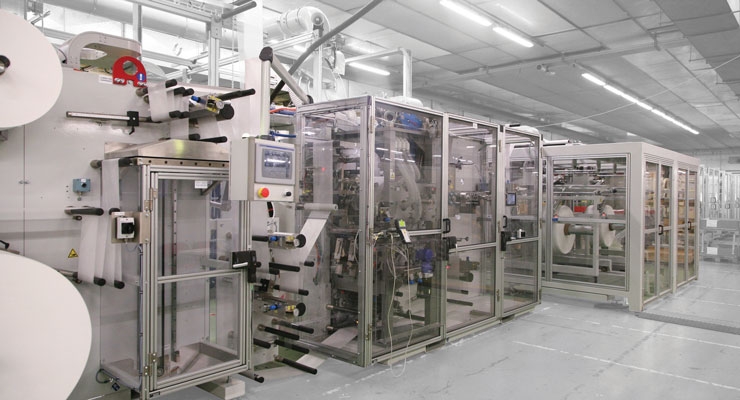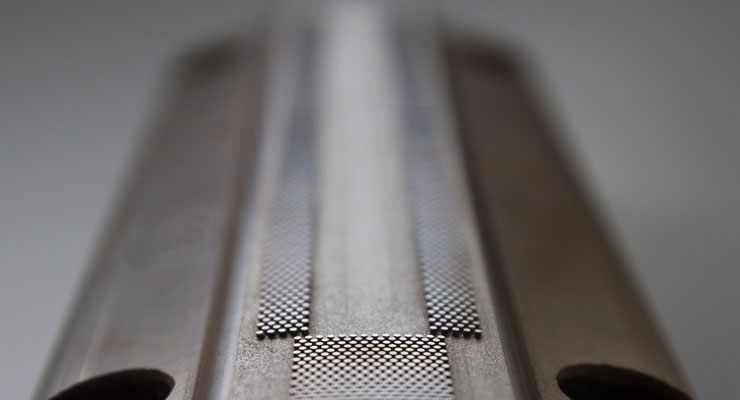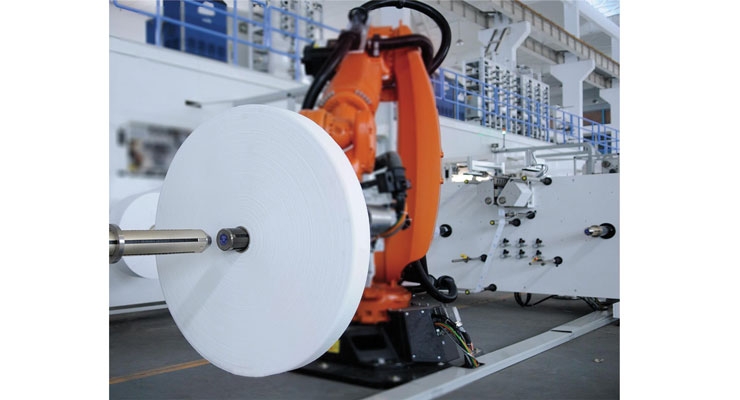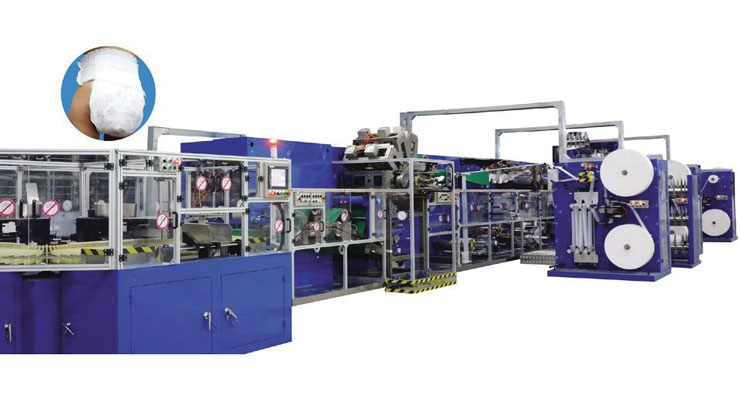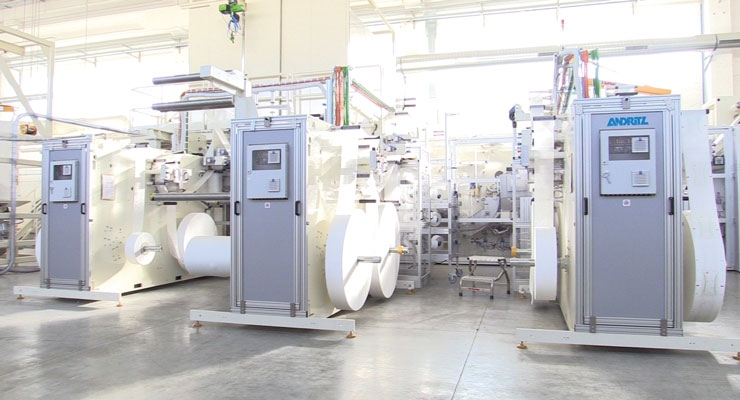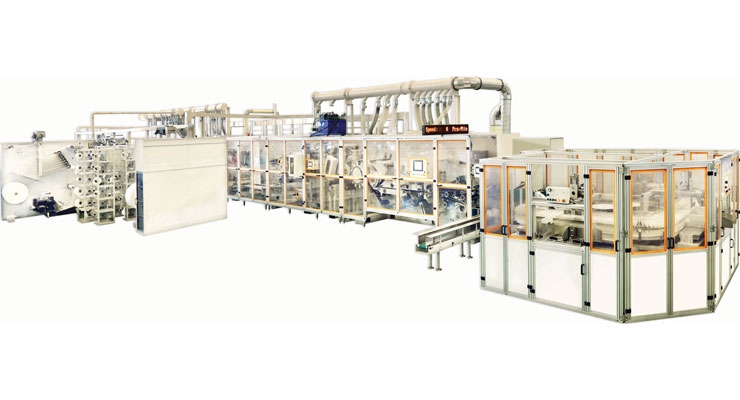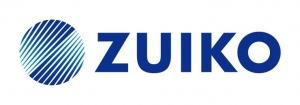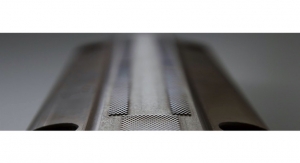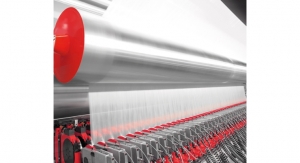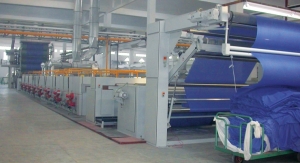Tara Olivo, Associate Editor01.03.20
In recent years, technology for products like baby diapers, feminine hygiene and adult incontinence products have evolved to become more flexible and efficient to respond to the different needs of manufacturers around the globe. Hygiene companies are looking to achieve more with their machinery investments and manufacturers have risen to the occasion with machines that provide the ability to offer a wider range of raw materials to make a more far reaching product line. The following is a look at what some of the world’s largest suppliers of hygiene machinery have to offer.
Fameccanica
As a result of increasing requests in the market for pull-on pant style diapers, hygiene machinery specialist Fameccanica is offering a wide range of baby pant machine platforms featuring a “cross-direction” manufacturing process for diapers with full waist elasticization and with production speeds ranging from 500 to 900 ppm. All platforms can produce baby pants with a three-piece H-structure or two-piece hourglass structure. On top of the traditional threads waist elasticization, Fameccanica has also recently introduced a new elasticization concept made by the continuous or intermittent application of elastic film with its well-known unique technology for in-line processing of breathable, elastic laminates.
The pant style diaper is also a must for the adult incontinence market, according to the company. Fameccanica can offer its range of machines from 250 to 500 pieces per minute. These machines are also designed to manufacture hourglass or H-shaped pants with the traditional thread waist elasticization version or with Fameccanica technology for in-line processing of breathable, elastic laminated waistbands with ultrasonically bonded transpiring spots, to create a discreet and soft-feeling product with maximum fit and comfort.
Besides pant diapers, the Fameccanica incontinence line-up also includes open diaper machines, which can manufacture both classic leg shaped or multipiece products, the last ones having either rectangular or shaped elastic zero trim ears.
“Fameccanica’s main efforts are aimed at making products with improved breathability, softness and fit,” says Alessandro D’Andrea, marketing and innovation manager. “Starting from its fluffless technology, Fameccanica developed a system for in-line manufacturing of a Multilayer SAP Core, which is a structure featuring soft composite, fast fluid intake and low rewetting.”
Another important achievement is the enhancement of its well-known Fameccanica Lamination System (FLS), an in-line solution for back ears made of a three-layer ultrasonically bonded laminate, with a breathable elastic area in the center for elastic ears, which is now six times more extensible, according to D’Andrea.
Also in the field of laminates, increased softness can be gained with Ari-El, Fameccanica’s new elastic laminated waistband solution.
“Fameccanica is also very focused on material transformation technologies, developing systems that can allow the in-line multicolor digital printing, in-line flexographic printing for the decoration of poly, nonwoven and elastic materials, and in-line perforation of nonwovens for the customization of hole dimensions, width and phase of the perforated material,” says Rossella D’Onofrio, product portfolio manager. “Needless to add that Fameccanica is always committed on improving production efficiency, long term process stability and optimization of changeover times.”
www.fameccanica.com
GDM
GDM’s complete converting and packaging product portfolio counts more than 50 solutions for baby open, baby pants, adult incontinence, lady and light incontinence segments and is designed to perfectly match its customers’ needs for performance, flexibility, scalability and innovation.
In recent years, disposable hygiene manufacturers are increasingly conveying their focus to final products and their attributes, and this has become the compass driving GDM’s innovation commitment and value generation.
Considering the baby pants segment, GDM’s platform covers different production capabilities – 600, 800 and 900 ppm – and it is designed for product quality and flexibility in terms of sizes, cost optimization and ease-of-use. GDM’s solutions enable premium materials processing, delivering the highest quality with the best baby comfort fit.
Comfort is also among the drivers that have inspired the company in the development of Extra Thin Core featuring permanent channels, a GDM patent-pending technology. Combining this need with the manufacturing demand to minimize cellulose usage without compromising key product parameters (absorbent particles homogeneous distribution, quality mix with SAP, core integrity), Extra Thin Core technology delivers soft, pliable, thin and light open diapers and pants.
Moreover, considering the cost perspective, GDM’s customers can take advantage of the outstanding process stability for an estimated annual raw materials saving up to 800k€ (GDM internal estimation on fluff and SAP consumption for 260 mn pcs/year) and reduced power consumption up to 40%, compared to the previous core formation process.
In the Packaging portfolio, GDM’s new SB50 GO line—showcased in November at the GDM China Days event—with 100% made in Italy design and available as turnkey or stand-alone, combines user-friendliness and reliability at an advantageous investment level, making it the perfect machine for the quantum leap in the fully automatic era.
According to GDM, the disposable hygiene machinery market is growing overall: hygiene companies are investing in new lines and updating the existing ones, with a different mix depending on the market.
The clearest trend it is currently experiencing is the shift from open to pant products in every market segment (baby, adult and light incontinence), driven by the consumers’ needs of convenience and discreetness: GDM offers technological solutions that match different market needs and guarantee optimized production costs.
Manufacturing costs minimization, high product quality standards, a progressive increase in the production speed and the focus on the Overall Equipment Effectiveness are the key parameters for GDM’s customers’ competitiveness. Furthermore, the raw materials industry is constantly introducing new materials, opening to manufacturers a wide range of core formation solutions (from Extra Thin to Fluffless concept), to differentiate their disposable hygiene products.
Finally, GDM constantly works to guarantee its customers the opportunity to exploit always new possibilities for high level line flexibility of the line: in this perspective, GDM’s lines are set-up to manage both traditional and innovative processes for the absorbent core construction.
www.gdm-spa.com
Curt G. Joa
Curt G. Joa, Inc. designs, builds and supports several hygiene machine platforms for manufacturing all absorbent hygiene products.
Its adult pant platform is comprised of the J8T-AP and J7I-AP, with production speeds of 500 ppm and 300 ppm, respectively. Both machine options can include stretch film lamination, with the flexibility to switch between stretch film and strands in minutes. The unique Auto Re-feed Feature maximizes material efficiency and reduces machine stops due to material damage. Also available is the Single Transfer Insert Placement Process (STIPP), allowing for multiple pitch lengths without changing the entire unit. In addition, cross directional placement control is also offered, which reduces downtime during size change by easily shifting the unit’s centerline.
For adult briefs, the J8T-AB has a production speed of 450 ppm and the inventive Gentle Touch Folder, which prevents cores from cracking while increasing the maximum machine speed. The tandem folding process results in tri- and quad-folded brief products.
On the baby care side, the baby pant platform J7I-BP has production speeds of 1000 ppm and the recently announced Single Anvil In-Line (SAIL) Bonder. The patent pending design breaks the correlation between the machine speed and bonding speed, providing a repeatable process for quality side seams at much higher production speeds. The SAIL Bonder technology provides better bond strength with unique designs, reduces overall costs for maintenance and material consumption, plus allows simple adjustments for size changes, according to Paula Inda, corporate director, Global Marketing. “The most significant aspect for efficiency, however, is that these benefits are provided at top production speeds, 1000-1200 ppm,” she adds.
Similar to the adult pant platform, the Single Transfer Insert Placement Process (STIPP) is available with the same benefits of multiple pitch lengths and cross directional placement control.
For baby diapers, the J8T-B has the production speed of 1200 ppm and the No Scrap Ear (NoSE) System. The unique process utilizes ergonomically or symmetrically shaped ears from a continuous web with no waste. The Joa NoSE System allows for different leading and trailing angles and shaped cuts. As the smaller version of the adult, the baby platform also includes the Gentle Touch Folder, which maintains the visual appeal and absorbent functionality of the diaper core.
The diversity of feminine care production is reflected by the variety of Joa production solutions offered from the platform. Both the J20S-PL and J20S-FN, with production speeds of 3000 ppm and 2600 ppm, respectively, have the Turn and Pitch (TAP) Unit for rotating individual inserts in the machine process. As the unit rotates, individual inserts are picked up and turned 90 degrees for transfer and repitch. For higher production speeds, two product streams can feed into two separate packaging machines with the Double Pad Turner. Two identical rotator units pick-up the product from the main process flow and rotate 90 degrees, diverting to the proper packaging machine. In addition, the platform includes the DEDE300 with production speeds of 1500 ppm for panty liners and 1000 ppm for sanitary napkins. The Universal Foam Applicator eliminates size changes, stretching foam strips and applying them at specific distances. Also available is the Flexographic Printing Unit with three-color printing of specific patterns in the ADL or topsheet. Finally the DEDE400 is included with its unique cross machine production process. Products are manufactured at 90 degrees to production direction, providing production speeds of 1500 ppm for both panty liners and sanitary napkins, and 500 ppm for winged napkins.
Meanwhile, Joa’s light incontinence platform includes the J20S-LI and DEDE330, with production speeds of 1500 ppm and 800 ppm, respectively. A variety of production capabilities are available for cores, materials and ADLs. In addition, the platform includes multiple processes for different fold and wrap options, including overwrap or pouch. The Flexographic Printing Unit can be included as well for either production solution.
A recent innovation from Joa is the patent-pending design of an expandable absorbent core structure that improves the performance of high-SAP core products. “The unique product feature and process design ensure the absorbent core and core wrap expand in unison, maintaining the overall integrity of the product, giving the manufacturer all the benefits of SAP and the user the confidence in the disposable hygiene product,” Inda says.
In response to Industry 4.0, the goal for Joa has been continuous progression toward an operator-less machine, and therefore it has implemented technologies initially for machine operation and preventative maintenance. Joa is now pursuing additional benefits for customers by providing smart contracts that give customers financial flexibility as well as financial stability. “These solutions solve the core issue of installing production capacity within financial capabilities and tolerances,” Inda says.
www.joa.com
Anqing Heng Chang Machinery
Anqing Heng Chang Machinery (HCH) is a leading manufacturer of personal care converting and packaging machines supplying the baby care, adult care and feminine care markets globally. As one of the industry leading manufacturers in China, HCH continues to improve converting technology and expand offerings globally aligned with multi-national and regional suppliers of consumer product companies.
Newest innovations include fluffless core on-line process, ultrasonic technology for various applications suitable for a wide range of material, unmanned material robotic loading solution, and so on, being available for all machine categories capable of reaching the mainstream high speed requirements.
aqhch.com.cn
Guangzhou Xingshi Equipments
Guangzhou Xingshi Equipments Co., Ltd., was founded in 1999 in China as a professional manufacturer of machine lines for disposable hygiene products. The first set of full servo sanitary napkin machines in China, and the first full servo baby diaper machine with stacker in China, was manufactured in Xingshi. Xingshi focuses on the complete solution for clients, and believes that it’s not only the supplier, but also a partner to its clients. Today, Xingshi’s services cover product design, raw material sourcing, fabrication, assembly and debugging, stated machine modification and product upgrades, as well as machine line maintenance and technician long-term service. Xingshi specializes in converting lines for sanitary napkins, baby diapers, baby pants, adult diapers and panty liners. It also launched a new stacker with the new auto-packaging machine.
Xingshi employs a skilled staff and has over 100 machining tools. It has the ability to make 50 machine lines each year. Its innovation and quick development makes Xingshi among the best choices in machinery for companies in the disposable hygiene products market. Good service and the stated team guarantee fast and efficient service for customers.
In recent years, Xingshi has committed to the development of high-speed machines and the supporting packaging solutions. At the same time, the MES developed by the company has been launched and run by many customers, which will provide customers with real-time and accurate data monitoring, analysis and comparison, report generation, etc., so as to realize real-time production information management.
www.xingshi.com.cn
Cellulose Converting Solutions
Cellulose Converting Solutions (CCS) manufactures a complete range of hygiene machinery including lines for adult pants and briefs, baby open diapers and pants, feminine napkins and pants, as well as for light incontinence products and under pads.
According to Enzo Pomilio, sales & marketing director, CCS is increasing the speed for all of its platforms, offering a complete set of solutions to answer the latest trends in the market including size change time reduction, raw materials consumption control and reduction, increase in the use of eco-friendly raw materials, as well as improved service to the final customer.
In response to Industry 4.0, CCS offers the opportunity to connect each machine to the cloud, giving the final customer the chance to follow the performance of their machine directly from a mobile phone or a tablet through an application. According to Gianpiero Ravicini, technical director for CCS, this application can monitor the main features of the machine, comprising raw material consumption, servomotor temperature and torque, efficiency, stops, etc.
In order to make its lines more environmentally attractive, CCS has studied different solutions to reduce the glue amount on the products and the total raw material consumption, for example, by replacing glue applications with welding processes, or by proposing features with zero trim processes. Another area where CCS is focusing its efforts is the introduction of technical solutions to reduce energy consumption of the converting lines.
“CCS is really flexible to listen to all customer requests and to find solutions that satisfy them,” says Pomilio.
CCS has developed an innovation center with different test stands, where the customer can test raw materials quality before putting them in the final products. “Today, for example, we can test ultrasonic weldability, core quality with a certain pulp and a certain SAP, and so on. CCS can personalize tests for specific customer needs,” he adds.
When describing the hygiene industry as a whole, Pomilio has seen interest from the final customer changing in recent years, with growth in baby pant product requests versus open diapers, as well as growth in adult product requests, mainly due to the growing percentage of aging people in the population.
Hygiene companies are still investing in new lines but are also converting or upgrading their existing assets and, in order to satisfy this demand, CCS has developed its skills to intervene on machines designed and manufactured by any OEM,” he concludes.
www.ccsol.it
Andritz Diatec
In 2018, international machinery specialist group Andritz added converting machinery to its portfolio when it acquired a 70% stake in Diatec S.R.L., a leading manufacturer of converting machines for the hygiene and food packaging industries.
Andritz Nonwoven provides a wide range of production solutions for nonwoven roll goods with its air-through bonding, needlepunch, spunlaid, spunjet, spunlace, wetlaid/Wetlace technologies, and it is now extending its market coverage, process technology and product range to also encompass the converting sector with the Andritz Diatec converting technologies.
“With Andritz Diatec, we have extended our product offerings for applications in the hygiene markets,” says Andreas Lukas, senior vice president of Andritz Nonwoven.
Customers can run trials on Andritz Diatec’s pilot facilities to optimize raw materials, roll goods and final product applications. “By joining forces, we can provide unrivalled expertise to the benefit of our customers,” Lukas adds.
With the technical competence and expertise of the Andritz Group, it now has the capability to further strengthen its R&D efforts and offer its customers innovative and value-added solutions for end-use products.
“Diapers are mainly made with spunbond fabrics and/or ultralight spunlaced webs and air-through-bonded nonwovens in line with market needs. As a result, we are able to operate in different diaper categories thanks to our wide process knowledge,” Lukas says.
Andritz Diatec’s product portfolio includes machines for the production of baby diapers, adult incontinence products, underpads, shaped pads, sanitary napkins and panty shields. Outside of hygiene, it offers state-of-the-art machines for the food pad industry as well as for medical and laminating processes.
“The demands on a modern production and converting plant are increasing constantly,” says Fabrice Ferretti, sales director of Andritz Diatec. “Always at the forefront of innovation, we are keen to develop new technologies and processes that will optimize our production lines so that they suit our customers’ needs perfectly. In particular, the growing interest in adult incontinence products has led us to focus our attention nowadays on the adult pants line with its high-quality components and innovative technology processes.”
As a long-time player in the market, Andritz Diatec is compelled to seek out innovative solutions to fulfill customer demands. This is why it offers technology according to market needs. Specific glue-free solutions are particularly important for pants, where softness and “wearability” are key factors for end users. “Not using glue in the process has advantages for both producers and end users,” explains Ferretti. “On the one hand, producers save money because they don’t have to invest in gluing equipment and glue storage. On the other hand, end users benefit from a soft fabric that is gentle on the skin, ensuring good fit and flexibility at the same time. In addition, less glue means a smaller environmental footprint, cleaner production processes and less material wasted.”
Moreover, with the aging population growing strongly worldwide, the incontinence market is destined to grow, according to Ferretti. In this scenario, the pant diaper and disposable underwear are the most interesting products, meeting the demands for reliable absorbency performance at the same time as comfort, softness and flexibility for end users. These products have broad distribution, and the market requires them in a wide and diverse range to cover the needs of both light and severe incontinence. Additionally, growing demands for ultrasoft/cushioning materials and end products are linking the demands of the market to the technology solutions developed by Andritz Nonwoven.
Andritz Diatec works together with customers to develop specific solutions in order to reduce waste and the consumption of energy and raw materials. According to Ferretti, requests are increasing for less energy-intensive processes, which can be achieved with new bonding methods. At the same time, all of its machines have an easy size change configuration to reduce machine downtime and hence maximize production processes.
Moreover, as digitalization progresses, special software is playing an increasingly important role in customers’ plants, making them more efficient and thus more environmentally friendly. “Companies have high expectations of the greater plant efficiency and increased profitability that can be gained by networking machines and applying such technologies as Smart Sensors and Big Data Analytics,” says Ferretti. “Andritz has many innovative and attractive digital solutions for existing and new plants offered under the technology brand Metris.”
When it comes to environmental issues, sustainable raw materials and biodegradable end products are becoming increasingly important as well. “We have a wealth of experience with fibers and raw materials and are also carrying out specific research on new and more sustainable fibers with new and better production methods,” Ferretti says.
Overall, hygiene companies are constantly looking to expand their business, working on ways to further increase sales and advance their products into new markets, he adds.
Currently, Andritz Diatec has several requests for new converting lines in Africa, where many new investors are located and the market is expected to grow.
www.andritz.com/diatec
Zuiko
An innovator of technology for baby diapers, adult incontinence products, feminine napkins and more, Zuiko’s advanced machinery adds customizations, conveniences, and features that provide greater long term value for customers keen on manufacturing one-of-a-kind products. For companies that don’t require advanced machinery, its standard machines utilize Zuiko’s tried-and-true technologies for efficient, stable and high quality production.
In recent years, Zuiko has implemented robotics as a solution to help minimize human labor, especially in areas of production where a mistake could lead to injury. Sensors and cameras in the converting machine relay information to the connected robotics and manipulate it based on pre-set instructions. “These technologies are a good option for manufacturers who are capable of integrating, operating and managing the robotics in their overall production flow,” says Curtis Woo of Zuiko Corporation’s marketing division.
In response to the sustainability trend, Zuiko offers a number of technologies that minimize raw material usage without harming product quality, function or performance. For example, its glueless system for leg cuffs and waistbands reduces the amount of petrochemicals in diapers and helps save hundreds of thousands of dollars in annual running costs. It also has processes that cut and reposition materials for more efficient usage, essentially doing more with less material, according to Woo.
Zuiko is a strategic partner to customers and “not just a vendor in the supply chain,” Woo says. “Even after a new line is delivered, we don’t consider our job done.”
Over the years, Zuiko has established three manufacturing facilities and six sales/service offices around the world where customers have access to Zuiko expertise, knowledge and support. The company most recently opened an office in Bangalore, India, which will help the company get closer to customers there and create a foundation for future growth in the region.
www.zuiko.co.jp
Quanzhou Hanwei Machinery
Established in 1989, Quanzhou Hanwei Machinery Manufacturing Co. Ltd. specializes in R&D, manufacturing, sales and service of equipment for disposable hygiene products. Hanwei is one of the first recommended equipment suppliers. Hanwei puts R&D as its core competence. In 2010, it began to work with many multinational companies for various R&D projects. Hanwei retained a talented staff with high design caliber. After years of continuous efforts, Hanwei has created its own design and development team, obtaining almost 100 invention patents. The company can ensure that its products are of high quality, high stability, high profitability and state-of-the-art.
In 2012, Hanwei began to build mid-to-high-end equipment apart from standard equipment. In 2014, the company successfully became one of the major players in the mid-to-high-end equipment market as it obtained recognition from most users.
Its all-servo automatic waistline baby diaper automated production line can achieve 800 pieces/min, the full servo baby training pants automated production line can achieve 700 tablets/min, and the full servo zero waste edge sanitary napkins automated production line can achieve 1200 pieces/min. Meanwhile, the full servo adult training pants automated production line can achieve 300 m/min.
Currently, Hanwei is expanding its international markets covering Europe, America, Japan, Russia, Southeast Asia, the Middle East and Africa. Hanwei is continuously in pursuit of faster delivery, higher accuracy and closer services to customers. In addition to stable equipment operation, technical support and operation training, Hanwei can work with customers to discuss product and equipment design, material selection, plant layout, site management, product testing, market positioning and many others. It hopes to establish a long-term, steady partnership with customers to achieve a win-win situation. Hanwei has both global vision and local strategy, and seeks to professionalize and internationalize its disposable sanitary products, and strive to build the Hanwei brand for the global market.
www.han-wei.com
Delta
Delta offers a wide variety of converting machines for the production of disposable hygiene products; lines tailor-made to customers’ needs. Delta has combined years of experience to work in product development to design more flexible machines that easily follow market trends and satisfy customers’ demands. For example, the market trends on thinner products has made Delta consider the big customers’ demands for more discreet products that offer optimum fit and guaranteed functionality. Delta’s efficient machines guarantee the production of high performance products, optimizing the consumption of raw materials.
The company’s investments in new technology in response to Industry 4.0 concepts have brought the construction of full servo production lines featuring high production speeds maintaining high stability and a remote control system that enables to detect, in real time, analysis of the production cycle and troubleshooting, according to Ida Guerreschi, sales manager. A flexible control logic enables changes in production processes, for example, producing different types of products on the same machine without a loss of time due to machine set up, as well as providing updates and changes remotely. Visual quality checks enhanced during the machine process will reduce failures and down-times, thanks to anomaly detection, which will constantly guarantee the quality of the final products. “All these technologies are a big help for our customers, who can always have high production standards,” Guerreschi says.
When it comes to environmental issues, Delta has long been committed to building machines with low energy consumption and low noise. Thanks to the flexibility of Delta machines, customers can play with the usage of raw materials, switching to standard type to biodegradable and eco-sustainable materials. Always supporting the environment, Delta has designed and built a revolutionary system to produce fluff-less core for light and heavy incontinence products, resulting in a real lowering of power consumption and space optimization.
According to Guerreschi, 2019 was considered essentially a “sabbatical year” for hygiene companies. It was a year of trade concerns, a year which saw intensive discussions on the world climate, but also a year in which innovations and solutions for the efficient use of more natural based raw materials will move the hygiene companies to review and implement their production offerings, looking at the safety and transparency of the materials used. “Delta can assist them in that direction,” she adds.
Delta will be bringing new projects and new developments to INDEX 2020 this year.
www.deltaconverting.com
Fameccanica
As a result of increasing requests in the market for pull-on pant style diapers, hygiene machinery specialist Fameccanica is offering a wide range of baby pant machine platforms featuring a “cross-direction” manufacturing process for diapers with full waist elasticization and with production speeds ranging from 500 to 900 ppm. All platforms can produce baby pants with a three-piece H-structure or two-piece hourglass structure. On top of the traditional threads waist elasticization, Fameccanica has also recently introduced a new elasticization concept made by the continuous or intermittent application of elastic film with its well-known unique technology for in-line processing of breathable, elastic laminates.
The pant style diaper is also a must for the adult incontinence market, according to the company. Fameccanica can offer its range of machines from 250 to 500 pieces per minute. These machines are also designed to manufacture hourglass or H-shaped pants with the traditional thread waist elasticization version or with Fameccanica technology for in-line processing of breathable, elastic laminated waistbands with ultrasonically bonded transpiring spots, to create a discreet and soft-feeling product with maximum fit and comfort.
Besides pant diapers, the Fameccanica incontinence line-up also includes open diaper machines, which can manufacture both classic leg shaped or multipiece products, the last ones having either rectangular or shaped elastic zero trim ears.
“Fameccanica’s main efforts are aimed at making products with improved breathability, softness and fit,” says Alessandro D’Andrea, marketing and innovation manager. “Starting from its fluffless technology, Fameccanica developed a system for in-line manufacturing of a Multilayer SAP Core, which is a structure featuring soft composite, fast fluid intake and low rewetting.”
Another important achievement is the enhancement of its well-known Fameccanica Lamination System (FLS), an in-line solution for back ears made of a three-layer ultrasonically bonded laminate, with a breathable elastic area in the center for elastic ears, which is now six times more extensible, according to D’Andrea.
Also in the field of laminates, increased softness can be gained with Ari-El, Fameccanica’s new elastic laminated waistband solution.
“Fameccanica is also very focused on material transformation technologies, developing systems that can allow the in-line multicolor digital printing, in-line flexographic printing for the decoration of poly, nonwoven and elastic materials, and in-line perforation of nonwovens for the customization of hole dimensions, width and phase of the perforated material,” says Rossella D’Onofrio, product portfolio manager. “Needless to add that Fameccanica is always committed on improving production efficiency, long term process stability and optimization of changeover times.”
www.fameccanica.com
GDM
GDM’s complete converting and packaging product portfolio counts more than 50 solutions for baby open, baby pants, adult incontinence, lady and light incontinence segments and is designed to perfectly match its customers’ needs for performance, flexibility, scalability and innovation.
In recent years, disposable hygiene manufacturers are increasingly conveying their focus to final products and their attributes, and this has become the compass driving GDM’s innovation commitment and value generation.
Considering the baby pants segment, GDM’s platform covers different production capabilities – 600, 800 and 900 ppm – and it is designed for product quality and flexibility in terms of sizes, cost optimization and ease-of-use. GDM’s solutions enable premium materials processing, delivering the highest quality with the best baby comfort fit.
Comfort is also among the drivers that have inspired the company in the development of Extra Thin Core featuring permanent channels, a GDM patent-pending technology. Combining this need with the manufacturing demand to minimize cellulose usage without compromising key product parameters (absorbent particles homogeneous distribution, quality mix with SAP, core integrity), Extra Thin Core technology delivers soft, pliable, thin and light open diapers and pants.
Moreover, considering the cost perspective, GDM’s customers can take advantage of the outstanding process stability for an estimated annual raw materials saving up to 800k€ (GDM internal estimation on fluff and SAP consumption for 260 mn pcs/year) and reduced power consumption up to 40%, compared to the previous core formation process.
In the Packaging portfolio, GDM’s new SB50 GO line—showcased in November at the GDM China Days event—with 100% made in Italy design and available as turnkey or stand-alone, combines user-friendliness and reliability at an advantageous investment level, making it the perfect machine for the quantum leap in the fully automatic era.
According to GDM, the disposable hygiene machinery market is growing overall: hygiene companies are investing in new lines and updating the existing ones, with a different mix depending on the market.
The clearest trend it is currently experiencing is the shift from open to pant products in every market segment (baby, adult and light incontinence), driven by the consumers’ needs of convenience and discreetness: GDM offers technological solutions that match different market needs and guarantee optimized production costs.
Manufacturing costs minimization, high product quality standards, a progressive increase in the production speed and the focus on the Overall Equipment Effectiveness are the key parameters for GDM’s customers’ competitiveness. Furthermore, the raw materials industry is constantly introducing new materials, opening to manufacturers a wide range of core formation solutions (from Extra Thin to Fluffless concept), to differentiate their disposable hygiene products.
Finally, GDM constantly works to guarantee its customers the opportunity to exploit always new possibilities for high level line flexibility of the line: in this perspective, GDM’s lines are set-up to manage both traditional and innovative processes for the absorbent core construction.
www.gdm-spa.com
Curt G. Joa
Curt G. Joa, Inc. designs, builds and supports several hygiene machine platforms for manufacturing all absorbent hygiene products.
Its adult pant platform is comprised of the J8T-AP and J7I-AP, with production speeds of 500 ppm and 300 ppm, respectively. Both machine options can include stretch film lamination, with the flexibility to switch between stretch film and strands in minutes. The unique Auto Re-feed Feature maximizes material efficiency and reduces machine stops due to material damage. Also available is the Single Transfer Insert Placement Process (STIPP), allowing for multiple pitch lengths without changing the entire unit. In addition, cross directional placement control is also offered, which reduces downtime during size change by easily shifting the unit’s centerline.
For adult briefs, the J8T-AB has a production speed of 450 ppm and the inventive Gentle Touch Folder, which prevents cores from cracking while increasing the maximum machine speed. The tandem folding process results in tri- and quad-folded brief products.
On the baby care side, the baby pant platform J7I-BP has production speeds of 1000 ppm and the recently announced Single Anvil In-Line (SAIL) Bonder. The patent pending design breaks the correlation between the machine speed and bonding speed, providing a repeatable process for quality side seams at much higher production speeds. The SAIL Bonder technology provides better bond strength with unique designs, reduces overall costs for maintenance and material consumption, plus allows simple adjustments for size changes, according to Paula Inda, corporate director, Global Marketing. “The most significant aspect for efficiency, however, is that these benefits are provided at top production speeds, 1000-1200 ppm,” she adds.
Similar to the adult pant platform, the Single Transfer Insert Placement Process (STIPP) is available with the same benefits of multiple pitch lengths and cross directional placement control.
For baby diapers, the J8T-B has the production speed of 1200 ppm and the No Scrap Ear (NoSE) System. The unique process utilizes ergonomically or symmetrically shaped ears from a continuous web with no waste. The Joa NoSE System allows for different leading and trailing angles and shaped cuts. As the smaller version of the adult, the baby platform also includes the Gentle Touch Folder, which maintains the visual appeal and absorbent functionality of the diaper core.
The diversity of feminine care production is reflected by the variety of Joa production solutions offered from the platform. Both the J20S-PL and J20S-FN, with production speeds of 3000 ppm and 2600 ppm, respectively, have the Turn and Pitch (TAP) Unit for rotating individual inserts in the machine process. As the unit rotates, individual inserts are picked up and turned 90 degrees for transfer and repitch. For higher production speeds, two product streams can feed into two separate packaging machines with the Double Pad Turner. Two identical rotator units pick-up the product from the main process flow and rotate 90 degrees, diverting to the proper packaging machine. In addition, the platform includes the DEDE300 with production speeds of 1500 ppm for panty liners and 1000 ppm for sanitary napkins. The Universal Foam Applicator eliminates size changes, stretching foam strips and applying them at specific distances. Also available is the Flexographic Printing Unit with three-color printing of specific patterns in the ADL or topsheet. Finally the DEDE400 is included with its unique cross machine production process. Products are manufactured at 90 degrees to production direction, providing production speeds of 1500 ppm for both panty liners and sanitary napkins, and 500 ppm for winged napkins.
Meanwhile, Joa’s light incontinence platform includes the J20S-LI and DEDE330, with production speeds of 1500 ppm and 800 ppm, respectively. A variety of production capabilities are available for cores, materials and ADLs. In addition, the platform includes multiple processes for different fold and wrap options, including overwrap or pouch. The Flexographic Printing Unit can be included as well for either production solution.
A recent innovation from Joa is the patent-pending design of an expandable absorbent core structure that improves the performance of high-SAP core products. “The unique product feature and process design ensure the absorbent core and core wrap expand in unison, maintaining the overall integrity of the product, giving the manufacturer all the benefits of SAP and the user the confidence in the disposable hygiene product,” Inda says.
In response to Industry 4.0, the goal for Joa has been continuous progression toward an operator-less machine, and therefore it has implemented technologies initially for machine operation and preventative maintenance. Joa is now pursuing additional benefits for customers by providing smart contracts that give customers financial flexibility as well as financial stability. “These solutions solve the core issue of installing production capacity within financial capabilities and tolerances,” Inda says.
www.joa.com
Anqing Heng Chang Machinery
Anqing Heng Chang Machinery (HCH) is a leading manufacturer of personal care converting and packaging machines supplying the baby care, adult care and feminine care markets globally. As one of the industry leading manufacturers in China, HCH continues to improve converting technology and expand offerings globally aligned with multi-national and regional suppliers of consumer product companies.
Newest innovations include fluffless core on-line process, ultrasonic technology for various applications suitable for a wide range of material, unmanned material robotic loading solution, and so on, being available for all machine categories capable of reaching the mainstream high speed requirements.
aqhch.com.cn
Guangzhou Xingshi Equipments
Guangzhou Xingshi Equipments Co., Ltd., was founded in 1999 in China as a professional manufacturer of machine lines for disposable hygiene products. The first set of full servo sanitary napkin machines in China, and the first full servo baby diaper machine with stacker in China, was manufactured in Xingshi. Xingshi focuses on the complete solution for clients, and believes that it’s not only the supplier, but also a partner to its clients. Today, Xingshi’s services cover product design, raw material sourcing, fabrication, assembly and debugging, stated machine modification and product upgrades, as well as machine line maintenance and technician long-term service. Xingshi specializes in converting lines for sanitary napkins, baby diapers, baby pants, adult diapers and panty liners. It also launched a new stacker with the new auto-packaging machine.
Xingshi employs a skilled staff and has over 100 machining tools. It has the ability to make 50 machine lines each year. Its innovation and quick development makes Xingshi among the best choices in machinery for companies in the disposable hygiene products market. Good service and the stated team guarantee fast and efficient service for customers.
In recent years, Xingshi has committed to the development of high-speed machines and the supporting packaging solutions. At the same time, the MES developed by the company has been launched and run by many customers, which will provide customers with real-time and accurate data monitoring, analysis and comparison, report generation, etc., so as to realize real-time production information management.
www.xingshi.com.cn
Cellulose Converting Solutions
Cellulose Converting Solutions (CCS) manufactures a complete range of hygiene machinery including lines for adult pants and briefs, baby open diapers and pants, feminine napkins and pants, as well as for light incontinence products and under pads.
According to Enzo Pomilio, sales & marketing director, CCS is increasing the speed for all of its platforms, offering a complete set of solutions to answer the latest trends in the market including size change time reduction, raw materials consumption control and reduction, increase in the use of eco-friendly raw materials, as well as improved service to the final customer.
In response to Industry 4.0, CCS offers the opportunity to connect each machine to the cloud, giving the final customer the chance to follow the performance of their machine directly from a mobile phone or a tablet through an application. According to Gianpiero Ravicini, technical director for CCS, this application can monitor the main features of the machine, comprising raw material consumption, servomotor temperature and torque, efficiency, stops, etc.
In order to make its lines more environmentally attractive, CCS has studied different solutions to reduce the glue amount on the products and the total raw material consumption, for example, by replacing glue applications with welding processes, or by proposing features with zero trim processes. Another area where CCS is focusing its efforts is the introduction of technical solutions to reduce energy consumption of the converting lines.
“CCS is really flexible to listen to all customer requests and to find solutions that satisfy them,” says Pomilio.
CCS has developed an innovation center with different test stands, where the customer can test raw materials quality before putting them in the final products. “Today, for example, we can test ultrasonic weldability, core quality with a certain pulp and a certain SAP, and so on. CCS can personalize tests for specific customer needs,” he adds.
When describing the hygiene industry as a whole, Pomilio has seen interest from the final customer changing in recent years, with growth in baby pant product requests versus open diapers, as well as growth in adult product requests, mainly due to the growing percentage of aging people in the population.
Hygiene companies are still investing in new lines but are also converting or upgrading their existing assets and, in order to satisfy this demand, CCS has developed its skills to intervene on machines designed and manufactured by any OEM,” he concludes.
www.ccsol.it
Andritz Diatec
In 2018, international machinery specialist group Andritz added converting machinery to its portfolio when it acquired a 70% stake in Diatec S.R.L., a leading manufacturer of converting machines for the hygiene and food packaging industries.
Andritz Nonwoven provides a wide range of production solutions for nonwoven roll goods with its air-through bonding, needlepunch, spunlaid, spunjet, spunlace, wetlaid/Wetlace technologies, and it is now extending its market coverage, process technology and product range to also encompass the converting sector with the Andritz Diatec converting technologies.
“With Andritz Diatec, we have extended our product offerings for applications in the hygiene markets,” says Andreas Lukas, senior vice president of Andritz Nonwoven.
Customers can run trials on Andritz Diatec’s pilot facilities to optimize raw materials, roll goods and final product applications. “By joining forces, we can provide unrivalled expertise to the benefit of our customers,” Lukas adds.
With the technical competence and expertise of the Andritz Group, it now has the capability to further strengthen its R&D efforts and offer its customers innovative and value-added solutions for end-use products.
“Diapers are mainly made with spunbond fabrics and/or ultralight spunlaced webs and air-through-bonded nonwovens in line with market needs. As a result, we are able to operate in different diaper categories thanks to our wide process knowledge,” Lukas says.
Andritz Diatec’s product portfolio includes machines for the production of baby diapers, adult incontinence products, underpads, shaped pads, sanitary napkins and panty shields. Outside of hygiene, it offers state-of-the-art machines for the food pad industry as well as for medical and laminating processes.
“The demands on a modern production and converting plant are increasing constantly,” says Fabrice Ferretti, sales director of Andritz Diatec. “Always at the forefront of innovation, we are keen to develop new technologies and processes that will optimize our production lines so that they suit our customers’ needs perfectly. In particular, the growing interest in adult incontinence products has led us to focus our attention nowadays on the adult pants line with its high-quality components and innovative technology processes.”
As a long-time player in the market, Andritz Diatec is compelled to seek out innovative solutions to fulfill customer demands. This is why it offers technology according to market needs. Specific glue-free solutions are particularly important for pants, where softness and “wearability” are key factors for end users. “Not using glue in the process has advantages for both producers and end users,” explains Ferretti. “On the one hand, producers save money because they don’t have to invest in gluing equipment and glue storage. On the other hand, end users benefit from a soft fabric that is gentle on the skin, ensuring good fit and flexibility at the same time. In addition, less glue means a smaller environmental footprint, cleaner production processes and less material wasted.”
Moreover, with the aging population growing strongly worldwide, the incontinence market is destined to grow, according to Ferretti. In this scenario, the pant diaper and disposable underwear are the most interesting products, meeting the demands for reliable absorbency performance at the same time as comfort, softness and flexibility for end users. These products have broad distribution, and the market requires them in a wide and diverse range to cover the needs of both light and severe incontinence. Additionally, growing demands for ultrasoft/cushioning materials and end products are linking the demands of the market to the technology solutions developed by Andritz Nonwoven.
Andritz Diatec works together with customers to develop specific solutions in order to reduce waste and the consumption of energy and raw materials. According to Ferretti, requests are increasing for less energy-intensive processes, which can be achieved with new bonding methods. At the same time, all of its machines have an easy size change configuration to reduce machine downtime and hence maximize production processes.
Moreover, as digitalization progresses, special software is playing an increasingly important role in customers’ plants, making them more efficient and thus more environmentally friendly. “Companies have high expectations of the greater plant efficiency and increased profitability that can be gained by networking machines and applying such technologies as Smart Sensors and Big Data Analytics,” says Ferretti. “Andritz has many innovative and attractive digital solutions for existing and new plants offered under the technology brand Metris.”
When it comes to environmental issues, sustainable raw materials and biodegradable end products are becoming increasingly important as well. “We have a wealth of experience with fibers and raw materials and are also carrying out specific research on new and more sustainable fibers with new and better production methods,” Ferretti says.
Overall, hygiene companies are constantly looking to expand their business, working on ways to further increase sales and advance their products into new markets, he adds.
Currently, Andritz Diatec has several requests for new converting lines in Africa, where many new investors are located and the market is expected to grow.
www.andritz.com/diatec
Zuiko
An innovator of technology for baby diapers, adult incontinence products, feminine napkins and more, Zuiko’s advanced machinery adds customizations, conveniences, and features that provide greater long term value for customers keen on manufacturing one-of-a-kind products. For companies that don’t require advanced machinery, its standard machines utilize Zuiko’s tried-and-true technologies for efficient, stable and high quality production.
In recent years, Zuiko has implemented robotics as a solution to help minimize human labor, especially in areas of production where a mistake could lead to injury. Sensors and cameras in the converting machine relay information to the connected robotics and manipulate it based on pre-set instructions. “These technologies are a good option for manufacturers who are capable of integrating, operating and managing the robotics in their overall production flow,” says Curtis Woo of Zuiko Corporation’s marketing division.
In response to the sustainability trend, Zuiko offers a number of technologies that minimize raw material usage without harming product quality, function or performance. For example, its glueless system for leg cuffs and waistbands reduces the amount of petrochemicals in diapers and helps save hundreds of thousands of dollars in annual running costs. It also has processes that cut and reposition materials for more efficient usage, essentially doing more with less material, according to Woo.
Zuiko is a strategic partner to customers and “not just a vendor in the supply chain,” Woo says. “Even after a new line is delivered, we don’t consider our job done.”
Over the years, Zuiko has established three manufacturing facilities and six sales/service offices around the world where customers have access to Zuiko expertise, knowledge and support. The company most recently opened an office in Bangalore, India, which will help the company get closer to customers there and create a foundation for future growth in the region.
www.zuiko.co.jp
Quanzhou Hanwei Machinery
Established in 1989, Quanzhou Hanwei Machinery Manufacturing Co. Ltd. specializes in R&D, manufacturing, sales and service of equipment for disposable hygiene products. Hanwei is one of the first recommended equipment suppliers. Hanwei puts R&D as its core competence. In 2010, it began to work with many multinational companies for various R&D projects. Hanwei retained a talented staff with high design caliber. After years of continuous efforts, Hanwei has created its own design and development team, obtaining almost 100 invention patents. The company can ensure that its products are of high quality, high stability, high profitability and state-of-the-art.
In 2012, Hanwei began to build mid-to-high-end equipment apart from standard equipment. In 2014, the company successfully became one of the major players in the mid-to-high-end equipment market as it obtained recognition from most users.
Its all-servo automatic waistline baby diaper automated production line can achieve 800 pieces/min, the full servo baby training pants automated production line can achieve 700 tablets/min, and the full servo zero waste edge sanitary napkins automated production line can achieve 1200 pieces/min. Meanwhile, the full servo adult training pants automated production line can achieve 300 m/min.
Currently, Hanwei is expanding its international markets covering Europe, America, Japan, Russia, Southeast Asia, the Middle East and Africa. Hanwei is continuously in pursuit of faster delivery, higher accuracy and closer services to customers. In addition to stable equipment operation, technical support and operation training, Hanwei can work with customers to discuss product and equipment design, material selection, plant layout, site management, product testing, market positioning and many others. It hopes to establish a long-term, steady partnership with customers to achieve a win-win situation. Hanwei has both global vision and local strategy, and seeks to professionalize and internationalize its disposable sanitary products, and strive to build the Hanwei brand for the global market.
www.han-wei.com
Delta
Delta offers a wide variety of converting machines for the production of disposable hygiene products; lines tailor-made to customers’ needs. Delta has combined years of experience to work in product development to design more flexible machines that easily follow market trends and satisfy customers’ demands. For example, the market trends on thinner products has made Delta consider the big customers’ demands for more discreet products that offer optimum fit and guaranteed functionality. Delta’s efficient machines guarantee the production of high performance products, optimizing the consumption of raw materials.
The company’s investments in new technology in response to Industry 4.0 concepts have brought the construction of full servo production lines featuring high production speeds maintaining high stability and a remote control system that enables to detect, in real time, analysis of the production cycle and troubleshooting, according to Ida Guerreschi, sales manager. A flexible control logic enables changes in production processes, for example, producing different types of products on the same machine without a loss of time due to machine set up, as well as providing updates and changes remotely. Visual quality checks enhanced during the machine process will reduce failures and down-times, thanks to anomaly detection, which will constantly guarantee the quality of the final products. “All these technologies are a big help for our customers, who can always have high production standards,” Guerreschi says.
When it comes to environmental issues, Delta has long been committed to building machines with low energy consumption and low noise. Thanks to the flexibility of Delta machines, customers can play with the usage of raw materials, switching to standard type to biodegradable and eco-sustainable materials. Always supporting the environment, Delta has designed and built a revolutionary system to produce fluff-less core for light and heavy incontinence products, resulting in a real lowering of power consumption and space optimization.
According to Guerreschi, 2019 was considered essentially a “sabbatical year” for hygiene companies. It was a year of trade concerns, a year which saw intensive discussions on the world climate, but also a year in which innovations and solutions for the efficient use of more natural based raw materials will move the hygiene companies to review and implement their production offerings, looking at the safety and transparency of the materials used. “Delta can assist them in that direction,” she adds.
Delta will be bringing new projects and new developments to INDEX 2020 this year.
www.deltaconverting.com

